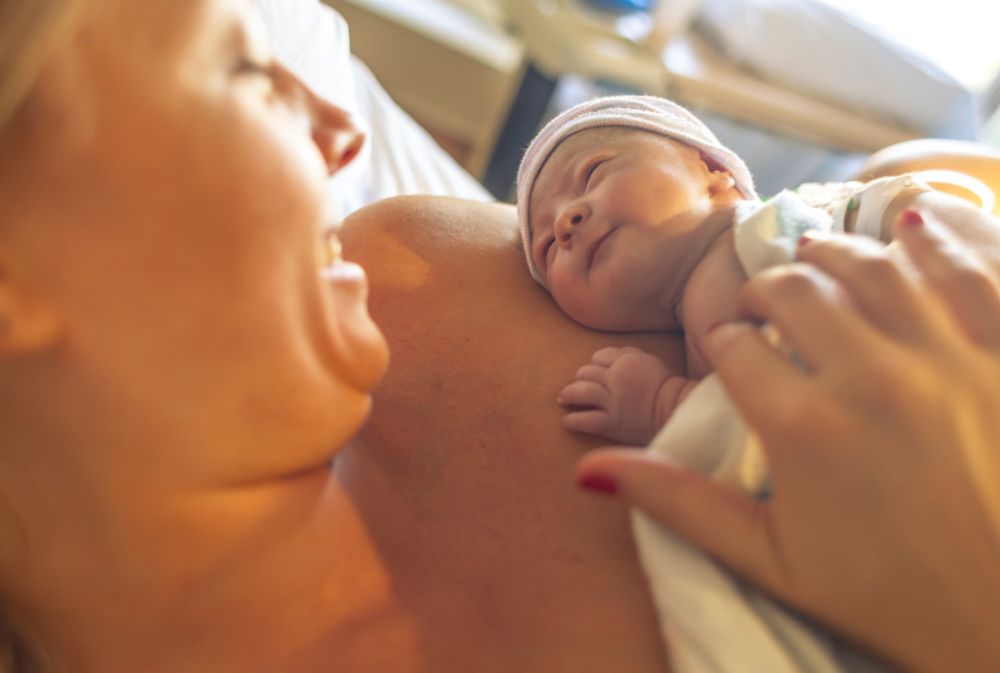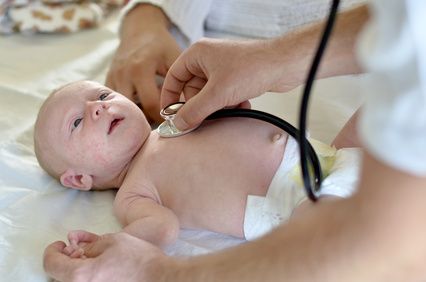Early days
Your baby after the birth
Your baby needs lots of attention and cuddles, this helps her to feel loved, secure, safe and gives her the best emotional start in life. Having skin-to-skin contact with your baby straight after the birth can help keep your baby warm and can help with getting breastfeeding started.
Your new baby
After birth new babies can sometimes look squashed or even bruised. This is normal and will disappear after a few days. Your baby is already aware of things going on around her. They can see and hear you. They will enjoy it when you touch their hands or feet. Talk to your baby and stay close to them.

First feed, weight gain and nappies
Some babies feed immediately after birth and others take a little longer.
The midwives and maternity care assistants will help you however you choose to feed your baby
For further advice on feeding for your baby click here
A baby doctor (neonatologist), midwife or newborn (neonatal) nurse will check your baby is well, and you will be offered a newborn physical examination for your baby within 72 hours of birth.

It's normal for babies to lose some weight in the first few days after birth. Putting on weight steadily after this is a sign your baby is healthy and feeding well.
Read more about your baby's weight, and nappies, including healthy poo.
Tests and checks for your baby
On day 5 to 8 after the birth, you'll be offered 2 screening tests for your baby:
- newborn hearing screening test - click here for further information
- blood spot (heel prick) test - click here for further information
If your baby is in special care, these tests will be done there. If your baby is at home, the tests will be done at your home by the community midwife team.
In the early days, the midwife will check your baby for signs of:
- jaundice
- infection of the umbilical cord or eyes
- thrush in the mouth
Please click here for further information
Safe sleeping for your baby
Make sure you know how to:
- put your baby to sleep safely to reduce the risk of cot death - click here
- tell when a baby is seriously ill - click here
2 weeks and beyond
You don't need to give your baby a bath every day. You may prefer to wash their face, neck, hands and bottom carefully instead.
Most babies will regain their birthweight in the first 2 weeks. Around this time their care will move from a midwife to a health visitor.
The health visitor will check your baby's growth and development at regular appointments, and record this in your baby's red book.
Your care after the birth
The maternity staff caring for you will check you're recovering well after the birth.
They will take your temperature, pulse and blood pressure.
They'll also feel your tummy (abdomen) to make sure your womb is shrinking back to its normal size.
Some women feel tummy pain when their womb shrinks, especially when they're breastfeeding. This is normal.
Seeing a midwife or health visitor
If you've given birth in hospital or a midwife unit and you and your baby are well, you'll probably be able to go home 6 to 24 hours after your baby is born.
Midwives will agree a plan with you for visits at home or at your local birth centre until your baby is at least 10 days old. This is to check that you and your baby are well, and support you in these first few days.
The Responsive Feeding Team works alongside the Community Midwives and Health Visitors to offer support and advice with feeding your baby for the first month after you have been discharged from hospital. They support with both breast and bottle feeding. The Team contact you by phone within 72 hours of you leaving hospital and at regular intervals during the first four weeks, they offer support by phone or by visiting you at home, whichever is best for you. Please click here for contact details.
How you may be feeling
Having a baby is a life changing event, your emotions will probably change every five minute
Feelings of sadness and depression are more common after childbirth than many people realise. It is perfectly normal to feel a bit down after the birth. Around 70% of all new mums suffer from so–called ‘baby blues’. Baby blues describes feelings of mild depression and tearfulness. It normally kicks in two to three days after the birth and shouldn’t last very long. But it can happen at any time and may last for only a couple of hours or up to a few days. This is quite different to post–natal depression.
Baby blues and how it might affect you
Caring for a new baby can be exhausting. Poor sleep and worrying about coping may upset your mood. You may feel really tired or generally not very well. You may cry for no particular reason and find it impossible to cheer up. Little things that you’d normally take in your stride suddenly seem like huge problems. We don’t exactly know what causes the baby blues, but we do know it’s perfectly normal. There could be hormonal reasons. The baby blues will go away, but it’s important to get extra support while it lasts. If these feelings don’t pass within a few days, talk to your midwife or health visitor.
For further information please click here.
Postpartum psychosis
This is a rare, severe episode of mental illness which begins suddenly in the days or weeks after having a baby, most often the first two weeks. It affects about one or two in every 1000 mothers.
The symptoms vary and can change rapidly. They can include high mood (mania), depression,* confusion, hallucinations and delusions. Postpartum psychosis is a psychiatric emergency and you should seek help from your GP, health visitor or midwife as soon as possible.




